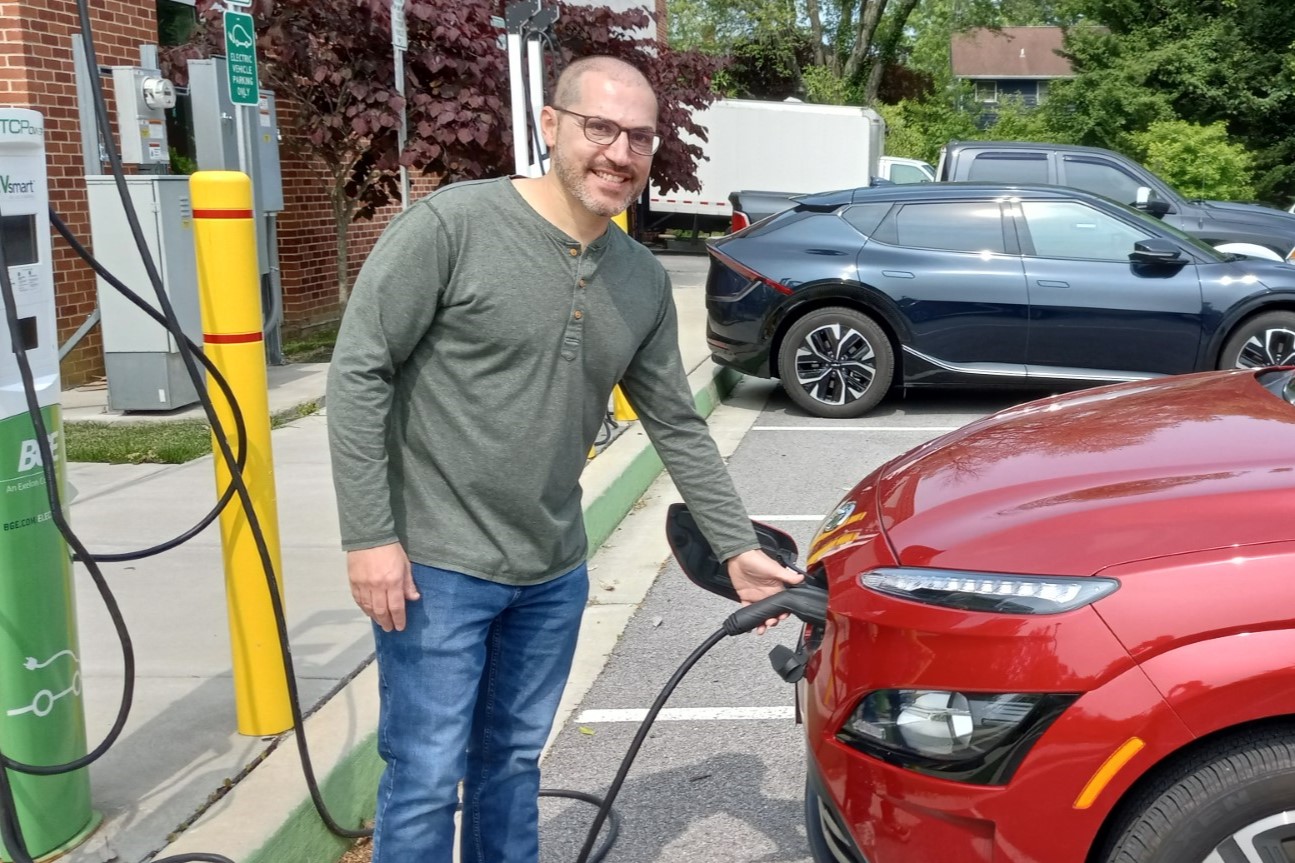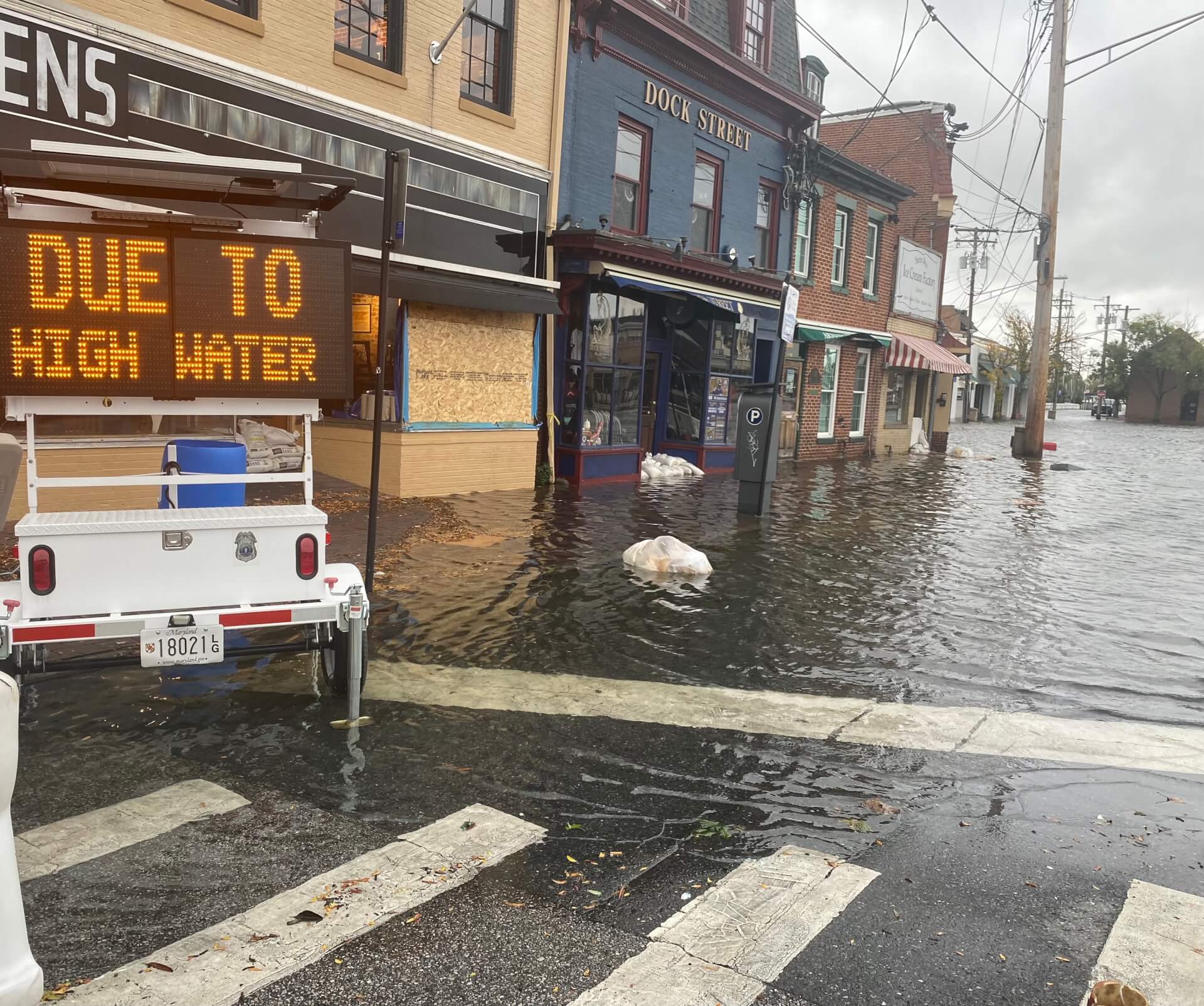From politics to green evangelism, one man’s journey parallels the EV industry’s

Josh Cohen was a young man in a hurry — not atypical for Maryland politics. He won his first election, to the Annapolis City Council, in 2001, at the age of 28. He figured he was on his way.
In 2006, he was elected to the Anne Arundel County Council. Three years after that, he became mayor in Annapolis, his hometown.
But at the age of 40, the Democrat’s political career was over. He was turned out by voters as he bid for a second term, losing to Republican Mike Pantelides, a younger man in a bigger hurry, by just 59 votes. On Dec. 2, 2013, Cohen walked out of City Hall as mayor for the last time.
“I was heartbroken because I had built my life around serving in public office,” he recalled in a recent interview. “I didn’t feel at the time that my political career was over, and I went through the different stages of grief.”
Cohen can laugh about it now.
“I think what became very quickly clear to me is that Mike Pantelides did me a huge favor by beating me, and I tell him that all the time.”
Not only did Cohen get his personal and family life back, but he remade himself professionally. Cohen traces his professional rebirth not to the day he left office, but to an earlier date, Oct. 11, 2012 — or 10/11/12, as he likes to point out. That’s the day he drove an electric vehicle for the first time, a perk extended to him as mayor by Tesla officials, who were passing through Annapolis as part of a national “Driving America Green” road show.
Cohen recalls driving around State Circle and Church Circle, zipping down West Street and feeling the roadster’s torque, eventually pulling into the Knighton Garage and charging the car at an early generation EV charging station that his administration had installed. It was thrilling and satisfying.
“That planted a seed,” Cohen said.
Today, the reformed politician is policy director for SWTCH, an international start-up that’s working to install EV charging stations at multi-family dwellings. He’s been in the position for just five months, but this is his third job in the EV industry in five years, and he’s been working on renewable energy issues for almost eight years, since serving as the deputy administrator at the U.S. Department of Agriculture’s Rural Utilities Service, during “the final quarter” of the Obama administration.
This makes Cohen, once a renewable energy neophyte, a veteran of the industry — and he’s become an evangelist for electric vehicles.
“In any other industry, I’d be considered a newbie,” he said.
Cohen has had to learn the technology, and the challenges of widely implementing it, on the fly. And with all his time in government — not just as a politician, but as a high-level bureaucrat at the state and federal levels — he’s had an unusual path and possesses a unique perspective on where the EV industry has been and where it needs to go.
In a sense, Cohen’s own journey is the industry’s, and vice-versa. He describes his mission as “accelerating electric transportation.”
“EVs sit at the intersection of the transportation and energy sectors,” he said. “And so to electrify transportation, we not only need to rethink vehicles. It also involves really reimagining the power sector and how we make that work together, and there are really challenges associated with that.”
Serendipity lends a hand
When his time in the Obama administration ended, Cohen knew he wanted to work in the clean energy sector. He just didn’t know how.
“I really struggled,” he said. “I really didn’t know what a clean energy career could look like.”
So he did a little consulting. He entered a graduate program in energy policy and climate at Johns Hopkins (he now has a Master’s degree). Then he decided to start a podcast, which he called “More Power to You.” That put him in regular touch with a lot of industry leaders.
“The amount of time I spent thinking about a name for the podcast was really ridiculous,” he said.
One friend suggested that Cohen try to specialize in as narrow an aspect of energy policy as possible.
“Carve out a niche for yourself,” Cohen recalled the friend saying. “If you are just an energy consultant and someone has a need for that, there will be a hundred [potential job applicants] that will be on their list. But you want to position yourself so if they have a need, you will be one of two or three people on that list.”
Through serendipity — a chance meeting here, a podcast guest there — Cohen found a series of part-time gigs. Eventually, he got consulting contracts with the Business Network for Offshore Wind, a national organization based in Baltimore, and with Mahi Reddy, the founder and CEO of SemaConnect, a EV charging company, who asked Cohen to help him set up a national association for EV companies (the effort fell short, but eventually Cohen went to work directly for the company as a policy analyst).
Eventually, though, the workload got to be too much, forcing Cohen to choose a specialization, just as his friend advised.
“One of the things I like about the offshore wind industry is that it has people from all walks of life,” he said. “You have brainy tech dudes and you have steelworkers. The EV charging industry in my experience is less diverse but intellectually to me it was way more fascinating and complicated.”
So Cohen shed the offshore wind contract and stayed with SemaConnect. Soon after, he landed a full-time job as East Coast policy director with Greenlots, another EV charging company, monitoring regulatory matters at state utility commissions as well as EV policy debates in state and local governments. Very quickly, the company was bought by a subsidiary of Shell Oil, and rebranded as Shell Recharge Solutions.
Cohen acknowledged that some people might see Shell’s participation in the EV charging market as some cynical form of “greenwashing.” But he said fossil fuel companies like Shell, that depend on gasoline sales, can be part of the climate solution.
“We need the industry to be real about EV charging,” he said.
‘The value of longer-term policy engagement’
Earlier this year, Cohen was offered a job as policy director — in a policy shop of one — at SWTCH Energy, which had been successful in Canada and was looking to expand into the U.S. market.
“It was a great fit,” Cohen said. “I love the culture at SWTCH. The CEO’s vision for policy engagement — he understands the value of longer-term policy engagement. It’s not just quick wins ahead of the quarterly earnings report. It’s long-range thinking and building relationships that shape the market but may not yield an immediate corporate return but are ultimately good for the industry.”
SWTCH is focused on installing EV chargers at multi-family apartment complexes, where some of the biggest shortfalls in the growing marketplace remain.
“Apartments and condos have been historically challenging for the EV charger industry for a number of reasons,” Cohen said. “So it’s a nice niche to get into.”
And nowadays, a lot of policymakers “are as interested as we are,” he said. They recognize that while the auto industry might be preparing to transition from combustion-engine cars to electric, until there are adequate places for motorists to charge their vehicles quickly, efficiently, and inexpensively, the marketplace will never reach critical mass.
SWTCH also sees it as an equity issue, Cohen said. Renters are “disproportionally lower income” than homeowners.
In his job, Cohen is eyeing regulatory and policy developments and the overall political landscape in all 50 states, the District of Columbia and Canada.
“It’s just me for now,” he said. “It’s cool. It’s startup world. It’s like, ok, Josh, it’s just you right now. Figure it out. We might staff up at some time, but for now, it’s just you. And it’s fun. It’s fun going from big corporate world to startup land.”
Cohen has to calculate where to spend his time and efforts.
“Part of the prioritization thought process is not just which states are more progressive, but where will the prioritization of my time be more likely to make a difference?” he said. “If you have a forward-thinking state that you know is going to do all these things regardless, my participation, my company’s participation is going to be helpful, but it’s not going to be as impactful as a state that’s interested in it that isn’t sure what it wants to do or how it wants to approach certain issues. It is interesting from a political standpoint how different states stack up.”
California is widely recognized as the clear leader in auto emissions standards, and has been for decades. Several states, including Maryland, are starting to follow California’s lead and seeking to become climate innovators on their own.
“But it’s interesting from a political standpoint how the culture within the state varies so much,” Cohen said. “So for example you can have a state with a governor and a legislature that are super pro-EV, but when it gets to actually implementing the regulations at the utility commission, the culture there can be much more hesitant. And you can have the reverse situation where you have a commission that’s very pro-EV but doesn’t want to get too far ahead without a clear direction of the legislature.”
Florida and New York provide two examples.
In New York, Cohen said, policymakers are committed to enabling the electric vehicle transition, but occasionally encounter resistance from the New York State Auto Dealers Association, which has great clout in Albany.
Florida, by contrast, “has been pretty pro-EV, even without anyone saying the words ‘climate change,’” Cohen reported. “Florida’s been supportive of EV’s. It hasn’t supported strong mandates like a lot of other states, but not just in terms of EV’s sold but also per capita, it is a leader… Florida has no mandates, but it’s very free market when it comes to auto sales. It’s just a reminder that there are a lot of ingredients that go into a state’s market landscape for EV’s. Politics is some of it, the market landscape is some of it.”
Florida is using some of the money it received from the Volkswagen emissions cheating scandal settlement several years ago to build a statewide network of fast EV chargers.
“Florida’s doing it through the lens of hurricane evacuation,” Cohen said. “We’re still getting to the same destination of having a network of fast charging EV stations, but it’s not because of climate change or these other reasons.”
Cohen has high hopes for Maryland’s electric transition.
“Maryland was an early leader,” beginning with the O’Malley administration, he said. “A number of Maryland’s utilities were early leaders, like BG&E and Pepco in particular, and that support continued through administrations. Maryland has continued to support electrification of transportation in bipartisan ways.”
Gov. Wes Moore’s (D) decision to follow California standards for electric vehicle sales will be especially impactful, he continued.
>> RELATED: Poll: About 60% of Marylanders oppose plan to mandate electric car sales by 2035
‘There’s still…a lack of understanding around EVs’
But political and industry progress can sometimes be dictated by personal imperatives. That’s what prompted Cohen’s boss to get into the business.
“My understanding is the reason Carter Li, the CEO of SWTCH, started the company was because he was living in a condo and wanted to install a charger and couldn’t. And he said, ‘I’ll pay for the whole thing.’ And they said no. And so he was a consultant at Deloitte at the time, and he left his job and started SWTCH, really to focus on that niche.”
Cohen has encountered similar resistance in the downtown Annapolis condo where he lives. So he finds himself charging his Hyundai Kona at the BG&E charging stations on city streets, or at the public library parking lot, or in one of the city’s garages — including Knighton, where his administration set up charging stations more than a decade ago.
There’s a lesson there, Cohen implies: If more Americans demand more charging stations, political leaders and utilities will have to comply — and they’ll have to ensure that the electric grid can handle the additional load.
“Where America is today is that, there’s still a lot of lack of understanding around EVs,” he said. “The full paradigm shift has not yet occurred, because EVs are fundamentally a different paradigm than gas-powered vehicles, where every week or so we take our gas-powered car, drive to a filling station and fill up. The EV paradigm is a lot more like a cell phone, where you charge when and where you can. So if you have charging at home, you charge overnight. If you have charging at work, you charge at work. There’s really a small percentage of overall use cases where you need a super-fast, high-powered charging.”
Cohen, whose car can go about 225 miles before needing to be recharged, admits that EV owners — and those who contemplate owning — can suffer from “range anxiety.” But that’s increasingly abating.
“It’s not plentiful yet but there’s enough of them there that, you spend just a minute looking up where you’re going, you’ll find a charger nearby,” he said.
Making EV chargers accessible to communities that have less access than most everyone else is Cohen’s mission for now. He just turned 50, and he’s not turning back.
“As much as I enjoyed the work of politics, and working with communities and solving problems, there’s a lot to like about not being in office and I have no interest in going back into politics myself now,” he said.
This story was updated to correct the spelling of the company name SWTCH.





 Creative Commons Attribution
Creative Commons Attribution